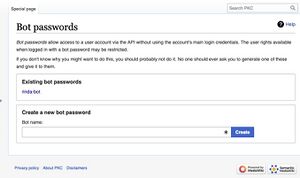Difference between revisions of "Mediawiki API"
| (10 intermediate revisions by the same user not shown) | |||
| Line 3: | Line 3: | ||
=Process Flow= | =Process Flow= | ||
This process flow is to | This process flow is to document on how the front-end application can communicate with an instance of Mediawiki, which in this context PKC. | ||
==Login Process== | ==Login Process== | ||
Mediawiki API | Mediawiki API has two different scenarios for handling the login process. | ||
===1. Using Robot Account=== | ===1. Using Robot Account=== | ||
This scenario is to | This scenario is to accommodate automation process on behalf of specified user. To enable the process, you will need to prepare your bot account, which can be done by visiting [Special:BotPasswords], then you decide the bot name and Mediawiki will prepare the username and password that can be use to access the API. Please see the right image for reference. | ||
[[File:Bot-password.jpg|thumb|center|Bot Password setup on Mediawiki]] | [[File:Bot-password.jpg|thumb|center|Bot Password setup on Mediawiki]] | ||
'''First API to call''' | '''First API to call''' | ||
| Line 84: | Line 84: | ||
sending as : ed965e6288be0ab007b8eab63637cca762eb3af1+\ | sending as : ed965e6288be0ab007b8eab63637cca762eb3af1+\ | ||
</pre> | </pre> | ||
Once you have API login replied as success, you can start the transaction using the same login token that is sent on second API. | |||
===2. Using Your Account=== | ===2. Using Your Account=== | ||
This scenario is to | This scenario is to accommodate a fully interactive process to Mediawiki, and position Mediawiki as the backend. | ||
==How to get one page according to page title== | |||
===1. Retrieving Page=== | ===1. Retrieving Page=== | ||
===2. | <nowiki>[your-media-wiki-url]?action=parse&format=json</nowiki> | ||
Parameter | |||
# action: parse | |||
# format: json | |||
Body | |||
# page: The title of the page | |||
===2. Create/Update Page=== | |||
To enable the creation or update page process, you will need to retrieve the CSRF Token (Cross-Site-Request-Forgery) as part of Mediawiki security implementation. Below is get CSRF token query: <br> | |||
<nowiki> | |||
[your-media-wiki-url]?action=query&meta=tokens&format=json | |||
</nowiki> | |||
and below is the result | |||
<syntaxhighlight lang="json"> | |||
{ | |||
"batchcomplete": "", | |||
"query": { | |||
"tokens": { | |||
"csrftoken": "5eb82e0b32ba6b5a88e54a6e3d38473c6347d6cd+\\" | |||
} | |||
} | |||
} | |||
</syntaxhighlight> | |||
Then, you can invoke the below API call to create or update the page. If the title is not yet available, API will automatically create the page. | |||
* Type=POST | |||
* [your-media-wiki-url]?action=edit&format=json | |||
Parameter | |||
# action=edit | |||
# format=json | |||
Body | |||
# title=[Page title] | |||
# appendtext=[text to be appended into the page] | |||
# text=[text to post to page] | |||
# token=[your CSRF token] | |||
=References= | |||
For complete reference, plase visit [https://pkc.pub?api.php PKC.PUB API Reference Page] | |||
<references/> | |||
[[Category:DevOps]] | |||
[[Category:PKC API]] | |||
Latest revision as of 09:25, 13 October 2022
Introduction to Mediawiki API
API stands for Application Programmer Interface, is one way of communicating through a system using a standard way of communication between applications. API Services of this mediawiki can be found in | API Documentation.
Process Flow
This process flow is to document on how the front-end application can communicate with an instance of Mediawiki, which in this context PKC.
Login Process
Mediawiki API has two different scenarios for handling the login process.
1. Using Robot Account
This scenario is to accommodate automation process on behalf of specified user. To enable the process, you will need to prepare your bot account, which can be done by visiting [Special:BotPasswords], then you decide the bot name and Mediawiki will prepare the username and password that can be use to access the API. Please see the right image for reference.
First API to call Type: GET Endpoint: /api.php?
| key | value |
|---|---|
| action | query |
| meta | tokens |
| format | json |
| type | login |
Response:
{
"batchcomplete": "",
"query": {
"tokens": {
"logintoken": "ed965e6288be0ab007b8eab63637cca762eb3af1+\\"
}
}
}
Second API To Call Type: POST Endpoint: /api.php?
| key | value | location |
|---|---|---|
| action | login | parameter |
| format | json | parameter |
| lgname | [your-bot-username] | body |
| lgpassword | [your-bot-password] | body |
| lgtoken | {from prev API} | body |
Response
{
"login": {
"result": "Success",
"lguserid": 9,
"lgusername": "[your-bot-username]"
}
}
Please noted on token value, as a response result from first API, you will need to pass excludes the last '\' character.
examples response : ed965e6288be0ab007b8eab63637cca762eb3af1+\\ sending as : ed965e6288be0ab007b8eab63637cca762eb3af1+\
Once you have API login replied as success, you can start the transaction using the same login token that is sent on second API.
2. Using Your Account
This scenario is to accommodate a fully interactive process to Mediawiki, and position Mediawiki as the backend.
How to get one page according to page title
1. Retrieving Page
[your-media-wiki-url]?action=parse&format=json
Parameter
- action: parse
- format: json
Body
- page: The title of the page
2. Create/Update Page
To enable the creation or update page process, you will need to retrieve the CSRF Token (Cross-Site-Request-Forgery) as part of Mediawiki security implementation. Below is get CSRF token query:
[your-media-wiki-url]?action=query&meta=tokens&format=json
and below is the result
{
"batchcomplete": "",
"query": {
"tokens": {
"csrftoken": "5eb82e0b32ba6b5a88e54a6e3d38473c6347d6cd+\\"
}
}
}
Then, you can invoke the below API call to create or update the page. If the title is not yet available, API will automatically create the page.
- Type=POST
- [your-media-wiki-url]?action=edit&format=json
Parameter
- action=edit
- format=json
Body
- title=[Page title]
- appendtext=[text to be appended into the page]
- text=[text to post to page]
- token=[your CSRF token]
References
For complete reference, plase visit PKC.PUB API Reference Page
